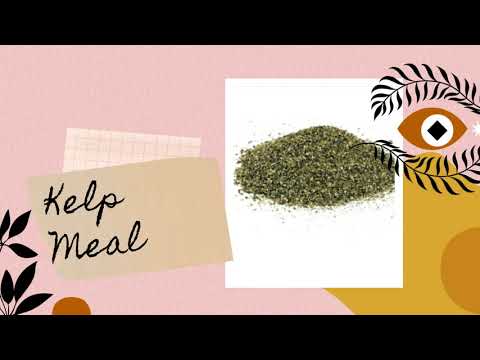In gardens, there are very few gardens with naturally suitable soil for growing plants…
But, as gardeners, we have a wide variety of amendments we can use to enrich the soil…
… improve its structure, and provide nutrients to encourage healthy plant growth.
Hear it from Mikey!
I used to think that package-bought potting soil or potting mix is enough…
I never really add anything because I believe in the store-bought ones…
Well they for sure do well for my plants…
But I didn’t know that adding soil amendments will boost their health even more!
Especially in times when the potting soil or potting mix had gone old…
… adding soil amendments is a preferable option to take.
I usually use compost because that’s the most common amendments I know…
But that’s not the only soil amendment out there!
There are other soil amendments available…
Soil Amendment is any substance which is intended to change the chemical or physical characteristics of soil. This does not include fertilizers, ag liming materials, pesticides and unmanipulated animal/vegetable manures. Soil amendment’s basic claims are to improve water retention, permeability, water infiltration, drainage, aeration, nutrient availability, and structure.
Pennsylvania Department of Agriculture
To ensure a bumper crop of homegrown vegetables..
..I use soil amendments like compost, leaf mold…
… and aged manure, which I dig into my beds during the spring..
between successive crops, and in autumn.
Learn more about the pros and cons of these organic soil amendments below…
Why Add Garden Soil Amendments?
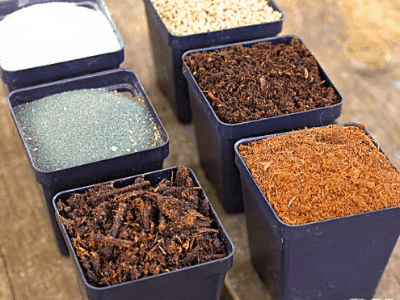
Most people assume soil consists mainly of particles like clay and sand…
… but in reality, soil is a complex ecosystem with minerals, organic materials, microbes, and countless organisms…
… that vary from region to region and also from backyard to backyard.
Plants require soil to anchor themselves, in addition to water and nutrients…
New gardeners quickly discover the importance of building good soil…
Experienced gardeners prize the dark crumbly bulk of the compost they make in their backyard bins…
Throughout the world, we add soil amendments to our gardens and vegetable plots…
… in order to grow better plants.
But what do these materials really do for our soil?
Here are a few of the many benefits of amending our soil:
- To increase soil organic matter
- To support the soil food web
- To increase the moisture holding capacity of soil
- To improve the texture and structure of soil
- To improve soil aeration
- To promote healthy plant growth and reduce plant diseases
Choosing A Garden Soil Amendment
There are so many types of soil amendments to choose from…
… how do you know which one is right? Start with a soil test.
A soil test shows you how healthy your soil is and gives you information…
… like pH, organic matter percentage, and general fertility.
You can then use this information in conjunction with your plant’s needs to select effective amendments…
Perhaps…
Your soil requires more nitrogen (adding composted animal manure)…
The soil in a vegetable garden will benefit from an amendment such as cow manure, as it breaks down quickly…
For a continuous feeding (such as perennial borders, or with long-term vegetables like tomatoes)…
… choose a material such as compost, which takes several months to break down.
The pH of the soil is another factor that affects plant growth…
Soils that contain too much acid or too much base prevent plants from taking up nutrients…
In regions with acidic soils, sulfur can be added to balance the pH…
Even if your garden is doing well, you should get a soil sample tested every four to five years…
Soil testing is relatively inexpensive, and it can help you decide what nutrient-rich garden amendments to add…
6 Types Of Garden Soil Amendments
If you visit any garden centre, you’re likely to see bags of compost, manure and other amendments…
Some larger nurseries may sell bulk materials for gardening…
Here are six of the most popular amendments available…
Compost
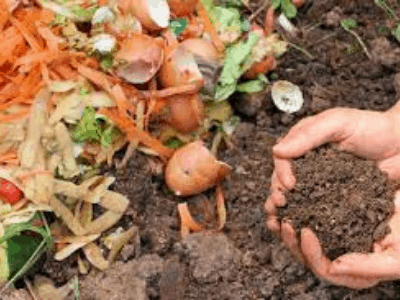
Compost is a common soil amendment that can be made in your garden or bought at a garden center…
It’s typically made of decomposed plant parts like vegetable peelings, leaves, and other garden debris…
The benefits of compost as a soil amendment include improving clay and sandy soils…
… increasing water retention and stimulating crop growth.
Composting is something I recommend gardeners do…
You can buy a bin, build one yourself or pile organic materials and let them break down on their own…
Composting isn’t an instant process and may take several years…
… before a pile decomposes into finished compost.
Compost finished looks and smells like soil and has a lovely dark brown color…
In composting…
The rate of decomposition is affected by many factors…
… including the types of materials, the temperature, the amount of moisture…
… and how the pile is maintained (by turning and getting enough air).
Adding compost to garden soils in spring, between successive crops…
… and in autumn helps improve soil biologically…
… and it makes an excellent mulch around tomatoes, cucumbers, and squash.
Compost lasts several months to decompose…
… and it provides a consistent soil improvement to perennial beds and borders.
Animal Manures
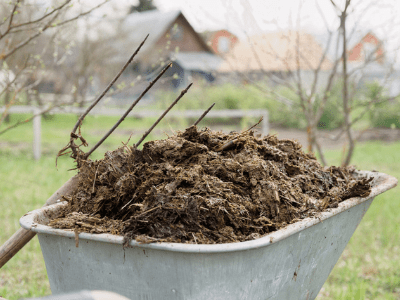
I usually purchase a truckload of aged manure every two to three years from a local farmer…
… purchasing enough to amend my beds for several seasons.
Livestock manure is available at garden centres and in bulk from farmers…
It is important to be aware that there are differences between cow manures…
… sheep manures, horse manures, and chicken manures.
I recommend conducting research before you decide which kind of manures to use…
… as their quality and availability vary greatly.
Bagged or bulk manure of cows is the most popular choice for gardens…
It’s rich in organic matter and provides all the nutrients the garden needs…
Sheep manure is one of the most popular bagged manures…
… because it contains nutrients like nitrogen and organic matter.
It is often thought that horse manure is weedy since horses don’t digest seeds at the same rate as cows…
However…
Less digested manure is also a richer soil amendment…
… so there are benefits and limitations to using horse manure.
Adding chicken manure to your garden will ensure it is free from weeds…
… but it is very high in nitrogen, and should be rotted before being placed in the garden bed.
It can also be added to a compost bin to accelerate the process and enrich the final product…
The rabbit manure, also known as bunny berries because it looks like small balls…
… is good for the garden as it is weed-free and doesn’t burn plants.
It adds organic matter and certain nutrients to the soil…
Inquire about herbicide and pesticide use when buying bulk manure…
Avoid fresh manure on growing crops as it may introduce dangerous pathogens to your food…
If you buy a truckload in the fall, you can stack half-rotted manure until spring…
I have thought that bagged manure is a good choice…
… because it’s usually sterilized and free of weed seeds.
However, buying bulk has caused certain weed species to invade my garden beds…
… and I’m always on the lookout for new weeds throughout the year.
Among the soil improvements available are vermicompost, which is primarily made from worm castings…
Worm castings are expensive and impossible for me to use in my large backyard…
… but I do use them in containers and indoors for house plants.
Chopped Leaves or Leaf Mold
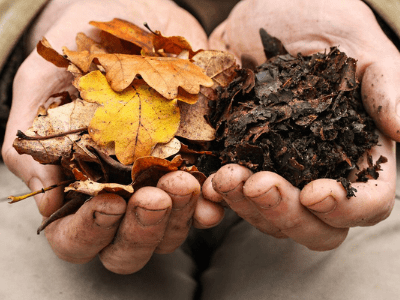
You can dig chopped leaves into the soil in autumn…
… or let them rot into leaf mold, which is one of my favourite soil amendments.
It improves soil structure and texture, increases water holding capacity, and adds a lot of humus…
The best part is that making your own leaf mold compost is incredibly easy…
You just need some leaves and some time…
Shredded leaves work best, as they break down faster…
You can shred leaves with a chipper/shredder or mow them 6 to 8 times to chop them into smaller pieces…
… and put them in a compost bin, a ring enclosure made by fencing wire, or pile them in a free-form pile.
Alternatively, you can create a compost pile right in your backyard…
… with the help of a wire enclosure and shredded leaves.
You can water the pile if you wish, or turn it with a garden fork…
… to incorporate some oxygen and speed up the process…
Leaf mold fills gardens with nutrients or makes an excellent mulch around plants…
If you plan on composting your leaf pile, it will still take one or two years to create attractive leaf mold…
Peat Moss
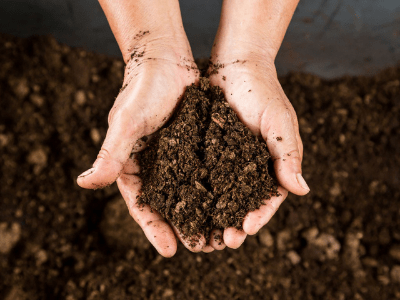
Frequently sold as a ‘soil conditioner’, peat moss is made from ground up dried sphagnum moss…
… and is also used in container gardening.
But rewetting dried peat moss is difficult because the material is very fluffy…
Dry peat moss does not attract water, so it is not a good choice as an amendment for mulching or top dressing…
It is also devoid of nutrients and microorganisms, and can acidify the soil…
Also controversial is peat moss, which is harvested from peat bogs…
… which are diverse habitats for animals, plants, birds, and insects.
Despite peat companies’ efforts to restore peat bogs, it takes decades or longer for them to fully recover…
Kelp Meal
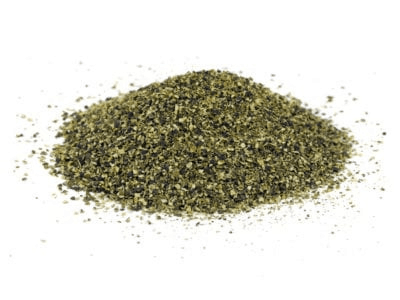
A seaweed that has been washed can be brought home from the tide line…
… added to a compost bin, or chopped and added during the autumn.
Seaweed is highly beneficial to plants related to micronutrients, soil fertility, and plant hormones…
If you live far from the sea…
You can use kelp meal to give your garden the same boost from the sea…
Kelp meal can be added to flower or vegetable beds in the spring…
I like to add a handful to each planting hole when moving tomato seedlings…
Should You Buy Bagged Or Bulk Garden Soil Amendments?
The decision of buying bagged or bulk comes down to a few considerations:
- How much do you need?
- Can you find it in bulk?
- Is there an extra delivery fee if you need to get bulk amendments?
Sometimes it’s cheaper to buy in bulk, sometimes it’s not…
Check the compost before you purchase it, give it a squeeze and examine its texture…
And if you buy in bulk, ask what the compost is made from…
If purchasing pre-bagged amendments, make sure to read the labels carefully to be sure what is inside the bags…
Bagged amendments are convenient and are often screened…
… to remove rocks, sticks, and other garden debris, as well as sterilized to kill weed seeds.
Making your own soil amendments is easy to do with organic materials, such as leaves and garden debris…
My homemade compost is my favorite soil amendment and I wish I had more space…
… for a dozen compost bins so I could make enough for all my raised beds.
When Should You Apply Garden Soil Amendments?
It’s not necessary to wait until spring to improve your soil…
I like to amend my garden as early as late summer when leaves are readily available…
And adding in autumn allows the soil food web time to break these materials down…
… so your plants can benefit in spring.
How Much Should You Add?
Mulches are applied after compositions of garden soil have been mixed into it…
The rate at which amendments are applied will depend…
… on your soil’s general health and structure as well as the chosen amendment.
Healthy garden soil contains between 4 and 5% organic matter…
When I plant my raised vegetable beds in the spring…
… I apply a layer of composted manure or compost about two to three inches thick.
Between successive crops I also apply more to my raised beds…
If I use kelp meal, I use the recommended application rate on the package…
To sum it up…
You should probably add soil amendments to your plant’s soil…
… so that they receive the perfect soil atmosphere for their growth.
You may choose between kelp meal, peat moss, compost, leaf mold, or animal manure…
… based on their benefit to soil that you’ve read above.
Conclusion
If you still have questions or want to give suggestions on the topic…
Comment down below to share your opinion about it!
Check out more posts on our website like this one here!
It would be our pleasure to be engaged with the gardening community!
Have an awesome gardening journey!

